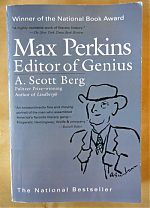
A. Scott Berg
Max Perkins
Editor of Genius
Publishing is not, of course, dependent on the individual taste of the publisher. He is under obligation to his profession which binds him to bring out a work which in the judgment of the literary world is significant in its literary qualities and is a pertinent criticism of the civilization of the time.
Those are just a few of the words of Maxwell Perkins, editor. He wrote those in response to a letter written by a reader shocked by the language in Ernest Hemingway’s The Sun Also Rises. I started reading Berg’s excellent biography of Max Perkins to learn about the life of an editor involved in book publishing. But in addition I got insights into writing, titles of books to read (not that I need anymore, please!), and the nagging question of what is a writer without a great editor.
Max Perkins was a great editor. He worked for Scribner’s and stood behind Hemingway, F. Scott Fitzgerald, Marjorie Rawlings, and Thomas Wolfe. He championed these writers when no one else did. But most of all, he helped bring their manuscripts into life as books. Before Max Perkins was an editor, editing was a job of mostly mechanics—there weren’t many who stepped into the book as he did. He stepped so far into the books that some of them would not be the masterpieces we still appreciate today. His knowledge was almost instinctual. He could pick out slags in plot and weak characters; he knew just what to emphasize and just what to cut; he could take an enormous beast of a manuscript, such as Thomas Wolfe’s Of Time and the River, and help massage it into something decipherable.
It was that manuscript, Wolfe’s Of Time and the River, that was his life’s work. Thomas Wolfe was a prolific writer who would load up his papers as the words and images came to him, without much thought as to where the whole thing was going. Wolfe and Perkins worked together to unravel the pieces into a story, a process that took months and many late nights. When it was published, the book was a success. Not long after, a critical article was published that said without Perkins, Wolfe would be nothing. Wolfe reacted badly and broke with Perkins. This story brought up a lot of questions for me, about the genius of writers and made me wonder how much about writing do writers need to know.
Perkins’s life was his work. He was so devoted to his writers that he advised on more than just writing problems. He helped them financially and bolstered them when they were feeling depressed. His philosophy was that an editor should be the man who stands in the shadows, who supports and points out a way. He wanted to be “a little dwarf on the shoulder of a great general advising him what to do and what not to do, without anyone’s noticing.” This biography brings a Perkins out of the dark and shows that more than just writers are vital to great books.
To end, some more words by Max Perkins:
Artists, saints, and the other more sentient representatives of the human race are, as it were, on the frontiers of time—pioneers and guides to the future. And the publisher, in the capacity mentioned, must make some sort of estimate of the importance and validity of their reports, and there is nothing he can base this on but the abilities to judge that God has given him.
· · · · · · · · · · · · · · · · · · · ·